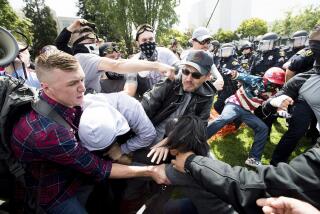Judge Rejects Defense Request to Delay Trial in King Case
- Share via
The judge presiding over the federal trial of four Los Angeles police officers accused of violating Rodney G. King’s civil rights rejected a request Monday to delay the proceeding even though a defense lawyer warned that new riots could erupt if the postponement was not granted.
“It makes sense to delay this trial as a matter of public safety,” Harland W. Braun, the lawyer for Officer Theodore J. Briseno, said on behalf of all four defendants. “I hope our fears are ill-founded, but we have to err on the side of caution.”
Braun warned that new civil unrest could erupt if the trial of the officers goes on simultaneously with that of three principal defendants charged in the beating of truck driver Reginald O. Denny early in the riots. That trial is scheduled to begin March 15, though it could be delayed. Jury selection for the trial in which the officers are charged is scheduled to begin on Feb. 3.
Some city officials are concerned about having two such volatile cases tried within a few weeks of each other, and Braun echoed those concerns in court Monday.
“We’re like runaway trains, in a sense, coming at each other,” he said of the two trials.
U.S. District Judge John G. Davies, who is presiding over the King civil rights case, conceded that the two trials could overlap, but said that he did not believe it was appropriate for him to consult with Superior Court Judge John W. Ouderkirk about scheduling for the cases. Despite the possible overlap, Davies said he did not believe there was a serious safety problem.
“I hope not,” he added.
Davies made his ruling during a status conference to discuss a variety of issues that remain unresolved two weeks before jury selection is scheduled to begin. Most of Monday’s hearing was devoted to arguments regarding the admissibility of state trial testimony from Briseno.
Briseno was the only one of the four defendants to break ranks during the state trial last year. Under questioning in that case, he testified that co-defendant Laurence M. Powell was “out of control” during the beating.
The four officers were acquitted on all counts except one against Powell, on which the jury could not reach a verdict.
Prosecutors in the federal case conceded that Briseno’s remark was not admissible as evidence because Briseno was not in a position to reach conclusions about Powell’s state of mind. The prosecutors also acknowledged that several other statements by Briseno during the state trial were inadmissible in the upcoming federal trial.
Defense lawyers agreed, and Davies accepted that agreement, so jurors in the trial will not hear those portions of Briseno’s earlier testimony.
Prosecutors did ask to be allowed to use another portion of Briseno’s testimony, however. Assistant U.S. Atty. Steven D. Clymer said Briseno had lied about his description of returning to the police station to report the use of force against King. Clymer argued that prosecutors should be allowed to introduce it because it demonstrates that Briseno had a “guilty state of mind.”
Davies agreed, and both sides also acknowledged that jurors in this trial should be allowed to hear Briseno’s descriptions of the beating and of his own actions. All of that testimony is to be admitted as evidence.
Michael P. Stone, the lawyer who represents Powell, said those statements could hurt his client, but he welcomed the exclusion of Briseno’s other comments. “I think it helps us,” Stone said.
As the date for jury selection draws near, the judge and lawyers for both sides are trying to agree on questions and procedures for determining whether potential jurors have biases that would prevent them from serving impartially on the case. The first step is to develop a questionnaire, and a number of samples are circulating among the attorneys.
Defense lawyers would like the chance to question jurors individually regarding their reactions to news reports of the beating and of last spring’s riots.
“Not only will it be essential to have questioning of individual jurors, but I think that we will find that it will be dangerous and unwise to conduct that questioning in the presence of other jurors,” Paul DePasquale, the attorney for former Officer Timothy E. Wind, told the judge.
More to Read
Sign up for Essential California
The most important California stories and recommendations in your inbox every morning.
You may occasionally receive promotional content from the Los Angeles Times.











